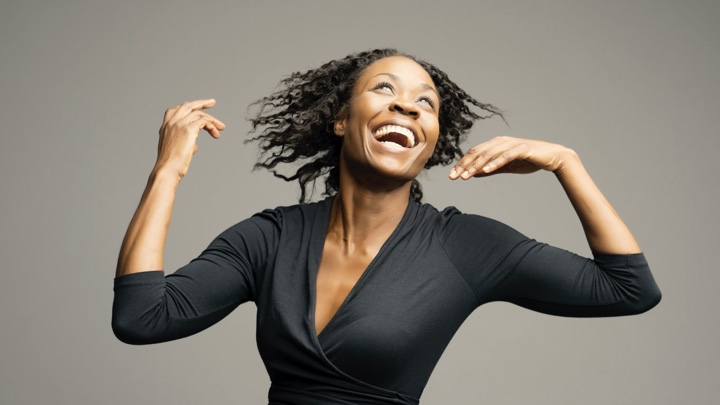

OSL’s concert didn’t present the four anthems as a group but scattered throughout an evening which also included the rousing Music for the Royal Fireworks and the Ode for the Birthday of Queen Anne, an earlier choral work that featured soloists Joélle Harvey, Iestyn Davies and Sumner Thompson.
For many years now I have preferred to listen to baroque music, whether in person or on recordings, performed by ensembles using period instruments. When Labadie and his modern-instrument ensemble tackled the Royal Fireworks suite, the boisterous trumpets and horns frequently overwhelmed the strings. Thankfully, that imbalance rarely reoccurred during the pair of festive choral works.
Founded by Labadie in 1985, the 35-member Canadian chorus sang with impeccable precision and refined enthusiasm. Labadie molded his singers into a strikingly unified sound for the Anthems, particularly in the thrilling opening of “Zadok the Priest” (which Labadie took very slowly) and the stirring conclusion of “The King Shall Rejoice.” Yet I missed the marvelous transparency that New York’s Clarion Society (of roughly the same number) brought to Handel’s Solomon at Carnegie last month.
The rarely performed 1713 Birthday Ode is one of the composer’s earliest English pieces and quite reminiscent of Henry Purcell’s odes. Many will know its highly unusual opening movement “Eternal Source of Light Divine” in which an alto and trumpet intertwine over softly rustling strings. Kevin Cobb’s forthright trumpet quite overshadowed a struggling Davies who broke up his long sinuous lines with extra breaths. The ubiquitous English countertenor then labored through the work’s frequent florid passages sounding most comfortable in his duets with the gleaming Harvey and agile Thompson.
The Coronation Anthems weren’t intended to be performed one after the other, but I do think they work best when heard as a group. Hervé Niquet and his Le Concert Spirituel released its CD on Alpha Classics late last year on which the Anthems are paired with the Dettingen Te Deum.
Niquet and his forces are best known for their long association with French baroque music rather than Handel, and though their pleasant Anthems are certainly listenable they are too unpredictable and unidiomatic to be recommended as a first or even second choice.
However, another French ensemble—the Choeur et Orchestre de l’Opéra Royale under Gaétan Jarry—released on 28 April another version of the Coronation Anthems on a CD entitled The Crown for the Chateau de Versailles label, and it’s a smashing success.
Recorded in late December just weeks after Queen Elizabeth II’s death, the CD was clearly conceived as a companion to the upcoming celebrations. I smiled when I received the preview copy which includes both Purcell’s and Handel’s settings of “My heart is indicting” on the day of Trump’s arraignment.
The Crown inserts trumpet salutes between choral selections along with shouts by the chorus of “God Save King Charles!” and is a jubilant follow-up to one of my very favorite CDs of 2022—Jarry’s joyous versions of three of Handel’s unjustly neglected Chandos Anthems.
Although I was initially put off by the prominent use of an organ in several of the anthems, Jarry’s soars above Niquet’s with consistently splendid, ebullient singing and playing, with the tenors and basses on especially strong form. He vividly emphasizes the striking contrasts between the anthem’s sections from the sensuous beauty of “The King shall have pleasure in thy beauty” to the devout grandeur of the “Allelujah” that concludes “Let thy Hand be Strengthened.”
I have yet to hear yet another new Coronation Anthems recording also due out at the end of this month. Justin Doyle collaborates with the RIAS Kammerchor and the Akademie för Alte Musik Berlin, and while it may also be outstanding, for now my recommendation rests with Jarry and The Crown. Those watching Charles’s wingding next month will surely hear Anthony Pappano conduct “Zadok the Priest” which has been performed at every coronation since 1727.
In between the English Concert’s Solomon and OSL’s concert, Carnegie Hall hosted another Handel-rich concert on March 29 when vivacious Trinidadian soprano Jeanine DeBique and Concerto Köln visited Zankel Hall. I wrote about their Mirrors CD in December 2021 soon after its release; since then, they have been touring the world offering selections from the recording on which DeBique pairs arias written for the same character by different composers. Many are by Handel, with others by Manna, Graun, Telemann and Broschi. Their concert at the last September’s Bayreuth Baroque Festival was televised.
Since Concerto Köln forgot to bring oboes to the US, the arias for Agrippina were not performed at Zankel, a real loss as we missed out on DeBique’s particularly affecting version of Telemann’s “Rimembranza crudel.”
The Zankel “Mirrors” concert wore its “concept” lightly; one might have easily mistaken it for simply a collection of baroque arias. Inevitably DeBique’s renditions have deepened as she’s lived with them over the past two years. Her strongest selections were those from Handel’s Giulio Cesare and Alcina, (at Zankel she performed “Ombre pallide” which was not included on the CD) perhaps because she has sung both operas on stage. Her graceful da capo ornaments throughout were imaginative although she sometimes ended arias with long unaccompanied cadenzas, a practice rarely embraced by others these days.
As on the CD DeBique’s appealingly rapid vibrato sometimes turns harsh as she ascends to acuti that she has added. She predictably brought the house down with her dizzying coloratura in “Tra le procelle” from Graun’s Cesare e Cleopatra, but her softly exquisite encore from Handel’s Il Trionfo del Tempo e del Disinganno (not part of the “Mirrors” scheme) made the most lasting impression.
Handel returns to Carnegie Hall in the fall when John Eliot Gardiner leads L’Allegro, Il Penseroso ed il Moderato, followed by Harry Bicket with Rodelinda.

























Comments